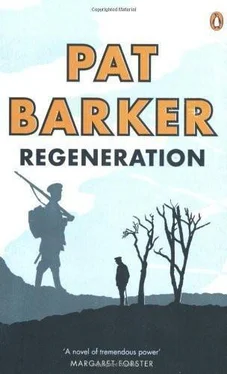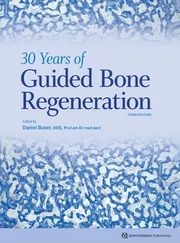Graves took the hand and pulled him into a bear hug. ‘Don’t be so bloody stupid, Siegfried. You know they do.’
Alone and shivering on the pavement, Sassoon thought about taking a taxi and decided against it. The walk would do him good, and if he hurried he could probably make it back in time. He threaded his way through the crowds on Princes Street. Now that Robert was gone, he hated everybody, giggling girls, portly middle-aged men, women whose eyes settled on his wound stripe like flies. Only the young soldier home on leave, staggering out of a pub, dazed and vacant-eyed, escaped his disgust.
Once he’d left the city behind, he began to relax and swing along as he might have done in France. He remembered the march to Arras behind a limber whose swaying lantern cast huge shadows of striding legs across a white-washed wall. Then… No more walls. Ruined buildings. Shelled roads. ‘From sunlight to the sunless land.’ And for a second he was back there, Armageddon, Golgotha, there were no words, a place of desolation so complete no imagination could have invented it. He thought of Rivers, and what he’d said that morning about finding safety unbearable. Well, Rivers was wrong, people were more corruptible than that. He was more corruptible than that. A few days of safety, and all the clear spirit of the trenches was gone. It was still, after all these weeks, pure joy to go to bed in white sheets and know that he would wake. The road smelled of hot tar, moths flickered between the trees, and when at last, turning up the drive into Craiglockhart, he stopped and threw back his head, the stars burst on his upturned face like spray.
A nightly bath had become essential to Rivers, a ritual that divided his meagre spare time from the demands of the hospital. He was already pulling his tunic off as he crossed the bedroom. Naked, he sat on the edge of the bath, waiting for it to fill. The hot tap was shiny; the cold, misted over, dewed with drops of condensed steam. Absent-mindedly, he played with the drops, making them run together to form larger pools. He was thinking about Prior, and the effect he was having on his room-mate, Robinson, and wondering whether it was worse than the effect Anderson was having on Featherstone. In any event, no single room was available. One solution to the Prior problem was to move Robinson into a room at present shared by two patients, although if the overcrowding were not to prove intolerable, the patients would have to be very carefully selected. He was still running through possible combinations as he bathed.
By his bed was the current issue of Man , still in its envelope. He hadn’t managed even to glance through it yet. And suddenly he was furious with the hospital, and Prior, and overcrowding and the endless permutations of people sharing that were made necessary by nightmares, sleep-walking, the need of some patients for night-lights and others for absolute darkness.
His irritation, groping for an object, fastened on Sassoon. Sassoon made no secret of his belief that anybody who supported the continuation of the war must be actuated by selfish motives, and yet if Rivers had allowed such motives to dominate, he’d have wanted the war to end tonight. Let the next generation cope with the unresolved problem of German militarism, just get me back to Cambridge and research. He flicked through the journal, but he was too tired to concentrate, and, after a few minutes, he switched off the light.
Shortly before dawn he woke. Still dazed from sleep, he put his hand to his left arm, expecting to feel blood. The dry cloth of his pyjama sleeve told him he’d been dreaming. He switched on the lamp and lay for a while, recollecting the details of the dream, then picked up a notepad and pencil from his bedside table and began to write.
I was in my room at St John’s, sitting at the table in front of the book case. Head was beside me, his left sleeve rolled up, and his eyes closed. The sleeve was rolled up well above his elbow, so that the full length of the incision was revealed. The scar was purple. The tablecloth was spread with various items of equipment: jugs of water, wisps of cotton wool, bristle brushes, compasses, ice cubes, pins.
My task was to map the area of hypersensitivity to pain on Head’s forearm. He sat with his eyes closed and his face turned slightly away. Every time I pricked him he cried out and tried to pull his arm away. I was distressed by this and didn’t want to go on, but I knew I had to. Head kept on crying out.
The dream changed and I was drawing a map of the protopathic area directly on to his skin. The pen was as painful as the needle had been. Head opened his eyes and said something I didn’t catch. It sounded like, ‘Why don’t
you
try it?’ He was holding an object out towards me. I looked down to see what it was, and saw that my own left arm was bare, though I couldn’t recall rolling up my sleeve.
The object in Head’s hand was a scalpel. I began to ask him to repeat what he’d said, but before I could get the words out, he’d leant forward and brought the scalpel down my arm, in the region of the elbow. The incision, although about six inches long, was so fine that at first there was no blood. After a second, small beads of blood began to appear, and at that point I woke up.
Rivers started to analyse the dream. The manifest content didn’t take long. Except for the cutting of his arm, the dream was an unusually accurate reproduction of events that had actually occurred.
Henry Head had been working for some time on the regeneration of nerves after accidental injury, using as his subjects patients in the public wards of London hospitals, before concluding that, if any further progress was to be made, more rigorously controlled tests would have to be done. Rivers had pointed out that these would have to be carried out on a subject who was himself a trained observer, since an extremely high degree of critical awareness would be needed to exclude preconceptions. Head had volunteered himself as the subject of the proposed experiment, and Rivers had assisted at the operation in which Head’s radial nerve had been severed and sutured. Then, together, over a period of five years, they had charted the progress of regeneration.
During the early stage of recovery, when the primitive, protopathic sensibility had been restored, but not yet the finely discriminating epicritic sensibility, many of the experiments had been extremely painful. Protopathic sensibility seemed to have an ‘all or nothing’ quality. The threshold of sensation was high, but, once crossed, the sensations were both abnormally widely diffused and — to use Head’s own word — ‘extreme’. At times a pinprick would cause severe and prolonged pain. Rivers had often felt distress at the amount of pain he was causing, but it would not, in life, have occurred to him to stop the experiment for that reason, any more than it would have occurred to Head. In the dream, however, the wish to stop the experiment had been prominent.
The latent content was more difficult. Superficially, the dream seemed to support Freud’s contention that all dreams were wish fulfilment. Rivers had wished himself back in Cambridge, doing research, and the dream had fulfilled the wish. But that was to ignore the fact that the dream had not been pleasant. The emphasis in the dream had been on the distress he felt at causing pain, and, on waking, the affect had been one of fear and dread. He didn’t believe such a dream could be convincingly explained as wish fulfilment, unless, of course, he wished to torture one of his closest friends. No doubt some of Freud’s more doctrinaire supporters would have little difficulty with that idea, particularly since the torture took the form of pricking him, but Rivers couldn’t accept it. He was more inclined to seek the meaning of the dream in the conflict his dream self had experienced between the duty to continue the experiment and the reluctance to cause further pain.
Читать дальше












